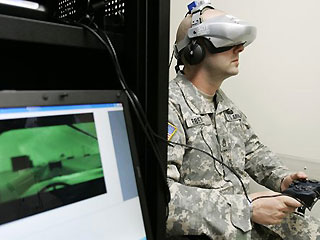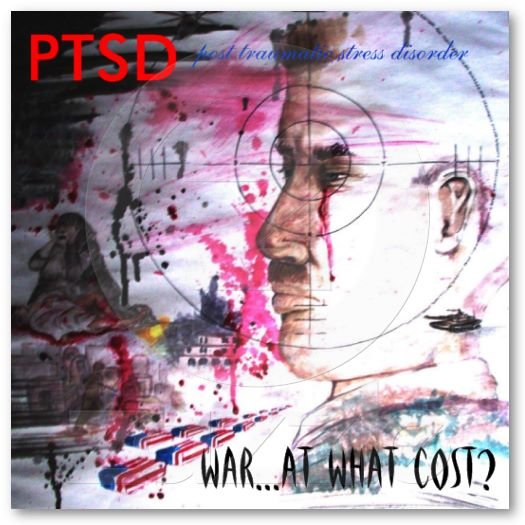
VCS Responds to AP: PTSD is Real, PTSD Fraud is Not Written by VCS – Republished on VT by permission from Veterans for Common Sense. Monday, 03 May 2010
|
| May 3, 2010 (updated May 8, 2010), Washington, DC (VCS)
On May 1, the Associated Press printed an incomplete and inaccurate article about veterans who file disability claims against the Veterans Affairs Department (VA) for post traumatic stress disorder (PTSD). Without citing a source, AP wrote, “The problem: The [VA claims] system is dysfunctional, an open invitation to fraud. And the VA has proposed changes that could make deception even easier.” AP is wrong, and VCS asked AP to correct the story. As of May 8, AP has not responded to our request for a correction. Here are two very important facts AP overlooked. If AP had included these two facts, then readers would understand more about VA and veterans suffering with PTSD after deploying to the brutal Iraq and Afghanistan wars, sometimes two or three times. POSTED BY: ROBERT L. HANAFIN, Major, U.S. Air Force-Retired, VT News Network Note: The P.T.S.D. lead in image used on the front page of our site is a logo for the upcoming film production by the same name Copyright LeviathanBlue Films LLC – http://www.leviathanblue.com. We have received copyright approval to use and display the logo, and we hope to be working with the producers of the movie to help promote the film. MORE TO COME. Major Hanafin. Fact Number One – There is no Fraud Problem There is no widespread fraud problem at VA. Out of more than one million claims per year, less than a score are ever investigated for fraud. Furthermore, in November 2005, VA auditors randomly selected 2,100 approved PTSD claims. After an exhaustive investigation, VA issued a press release confirming VA found zero cases of fraud. VA has extensive methods to prevent fraud, contrary to AP’s baseless assertion. AP should have mentioned VA’s investigation and findings. VA’s 2005 investigation began when a reporter at the Chicago Sun Times observed VA pays different average amounts in disability benefits based on a state-by-state comparison, according to VA’s own statistics. The true culprits for the different ratings? The Veterans Bernefits Administration (VBA), the agency within VA responsible for processing claims suffers from poor leadership, staff shortages, insufficient oversight, and a lack of consistent training, leading to poor quality decisions that are often prematurely denied. Recent audits of VBA indicate VBA makes a mistake in one out of every four claims, a tragic and catastrophic quality failure most often harming veterans. VA Secretary Shinseki is taking bold steps to address VBA’s systemic challenges, and he has broad support among veterans’ groups. There is a huge difference between a VA error and an allegation of fraud against veterans, and AP appears to have confused the two. Fact Number Two – PTSD is Very Real
VA and independent scientists overwhelmingly agree the diagnosis of PTSD is very real. Our goal at VCS is for the scientific evidence to match VA’s rules for obtaining disability benefits and healthcare. That’s responsible, and that’s fair. Here’s a briefing for returning service members showing VA knows PTSD is real. VA’s guide also offers practical information on what to expect and what to do when a service member returns home from war. Here’s what independent scientists found. On November 15, 2007, the Institute of Medicine (IOM) at the National Academy of Science reviewed scores of peer-reviewed and published scientific studies and validated the diagnosis of PTSD is associated with deployment to a war zone. In their review, “Gulf War and Health, Volume 6,” IOM concluded: The epidemiologic literature on deployed vs nondeployed veterans yielded sufficient evidence of an association between deployment to a war zone and psychiatric disorders, including posttraumatic stress disorder (PTSD), other anxiety disorders, and depression; alcohol abuse; accidental death and suicide in the first few years after return from deployment; and marital and family conflict, including interpersonal violence (page 319). AP should have reported on the IOM’s scientific findings. The escalating suicide epidemic among active duty service members and veterans represents clear and convincing evidence of the tremendous psychological impact of war. Repeated deployments into war zones where car bombs and roadside bombs are daily and deadly events killing and maiming our troops as well as innocent civilians underscore the exposure to enormous psychological trauma of our service members. PTSD is not new. According Thomas Childers, a history professor at the University of Pennsylvania, “1.3 million American troops were hospitalized for what were referred to as ‘neuropsychiatic’ symptoms” among the 16 million total service members during the war. That means more than eight percent of our troops were hospitalized for serious mental health problems while still serving in uniform. Childers’ research also found “VA duly reported that the divorce rate for veterans was twice as high as for civilians.” Unemployment for veterans was triple the civilian rate, Childers wrote. PTSD often lasts a lifetime, concluded Childers. “In the 1990s, older veterans were beginning to turn up at the VA – men who had made a successful readjustment to civilian life after the war. Yet they still suffered from recurring nightmares, problems with close relationships, or anger” (VFW Magazine, April 2009). Good News on the Horizon for Veterans After years of joint efforts by Congress and veterans’ groups, including Veterans for Common Sense, this month VA is expected to publish responsible and reasonable regulations expanding disability compensation benefits and healthcare to veterans who deployed to war and who are subsequently diagnosed with PTSD. The new regulations are based on science, a policy improvement fully supported by VCS. The importance of these regulations is underscored by the lasting adverse physical consequences of PTSD. VA’s action may bring medical treatment sooner for our Iraq and Afghanistan war veterans. This may mitigate the number of broken families, unemployed veterans, and psychological suffering. Of the two million U.S. troops deployed to the Iraq and Afghanistan war zones, VA physicians have already treated 508,000 veterans. Of those, 144,000 recent combat veterans were diagnosed with PTSD as of September 2009, according to VA reports obtained by VCS. In contrast, only 67,000 of the same veterans were approved for PTSD disability benefits by VBA. The fact only half of the veterans diagnosed with PTSD receive disability payments and lifetime access to mental healthcare is a strong indicator VBA claims system is overly restrictive and not properly serving our veterans. In order to continue receiving free medical care more than five years after leaving the military, recent war veterans usually need an approved VBA disability claim. PTSD is a very real and very serious problem increasing in scope the longer the current wars continue.
This important regulatory victory for veterans, based on decades of peer-reviewed, published scientific research, represents a bold, pro-veteran improvement by VA Secretary Erik Shinseki to open the doors for benefits and treatment to hundreds of thousands of deserving veterans suffering years or decades with PTSD who earned and who need VA assistance. Previous Attacks on Veterans and PTSD There have been attacks on veterans and veterans with PTSD in the recent past. Our VCS July 2007 Congressional Testimony describes how the previous Administration fought against PTSD hea The AP article was a disservice to veterans as it may perpetuate stereotypes of veterans with PTSD as frauds, when the science clearly shows they are not. At VCS we encourage our veterans with PTSD symptoms to seek care from VA. They may have to wait and wade through red tape, yet veterans groups and VA are working hard to fix that, too. PTSD is Real; PTSD Fraud is Not
We ask AP to cover the real challenges facing many of our veterans, such as unemployment, waiting for claims, timely access to care, stigma, and more. In our view, PTSD is real, and charges of PTSD fraud are not. AP should be reporting about success stories among veterans, about how to identify veterans at risk, and where veterans and families can get help, especially factual information from VA. AP should correct their story and apologize for stigmatizing veterans. We are still waiting for a reply from AP. UPDATED MAY 8, 2010 |
Readers are more than welcome to use the articles I’ve posted on Veterans Today, I’ve had to take a break from VT as Veterans Issues and Peace Activism Editor and staff writer due to personal medical reasons in our military family that take away too much time needed to properly express future stories or respond to readers in a timely manner.
My association with VT since its founding in 2004 has been a very rewarding experience for me.
Retired from both the Air Force and Civil Service. Went in the regular Army at 17 during Vietnam (1968), stayed in the Army Reserve to complete my eight year commitment in 1976. Served in Air Defense Artillery, and a Mechanized Infantry Division (4MID) at Fort Carson, Co. Used the GI Bill to go to college, worked full time at the VA, and non-scholarship Air Force 2-Year ROTC program for prior service military. Commissioned in the Air Force in 1977. Served as a Military Intelligence Officer from 1977 to 1994. Upon retirement I entered retail drugstore management training with Safeway Drugs Stores in California. Retail Sales Management was not my cup of tea, so I applied my former U.S. Civil Service status with the VA to get my foot in the door at the Justice Department, and later Department of the Navy retiring with disability from the Civil Service in 2000.
I’ve been with Veterans Today since the site originated. I’m now on the Editorial Board. I was also on the Editorial Board of Our Troops News Ladder another progressive leaning Veterans and Military Family news clearing house.
I remain married for over 45 years. I am both a Vietnam Era and Gulf War Veteran. I served on Okinawa and Fort Carson, Colorado during Vietnam and in the Office of the Air Force Inspector General at Norton AFB, CA during Desert Storm. I retired from the Air Force in 1994 having worked on the Air Staff and Defense Intelligence Agency at the Pentagon.
ATTENTION READERS
We See The World From All Sides and Want YOU To Be Fully InformedIn fact, intentional disinformation is a disgraceful scourge in media today. So to assuage any possible errant incorrect information posted herein, we strongly encourage you to seek corroboration from other non-VT sources before forming an educated opinion.
About VT - Policies & Disclosures - Comment Policy

 AP asserted the standards for reviewing PTSD claims will be “loosened,” an assertion made without attribution. In contrast to AP’s speculation, VA’s proposed new standards will be based on scientific evidence.
AP asserted the standards for reviewing PTSD claims will be “loosened,” an assertion made without attribution. In contrast to AP’s speculation, VA’s proposed new standards will be based on scientific evidence. The scientific challenges understanding PTSD are similar to the many years scientists and VA took to recognize disabilities associated with Agent Orange / dioxin poisoning among Vietnam War veterans. Science is now catching up, and many diseases are now scientifically associated with toxic exposures.
The scientific challenges understanding PTSD are similar to the many years scientists and VA took to recognize disabilities associated with Agent Orange / dioxin poisoning among Vietnam War veterans. Science is now catching up, and many diseases are now scientifically associated with toxic exposures. lthcare and benefits for our veterans. Unfortunately, a few people are opposed to healthcare and benefits for our veterans, just as there are some people who still think the world is flat or that dinosaus walked the earth at the same time as humans. The web site VA Watchdog wrote an op-ed about attacks on PTSD. The Boston Review newspaper published a article on this subject as well.
lthcare and benefits for our veterans. Unfortunately, a few people are opposed to healthcare and benefits for our veterans, just as there are some people who still think the world is flat or that dinosaus walked the earth at the same time as humans. The web site VA Watchdog wrote an op-ed about attacks on PTSD. The Boston Review newspaper published a article on this subject as well. Most veterans return home from war and readjust well, yet a recent Stanford University study estimated up to 35 percent of returning Iraq and Afghanistan war veterans may develop PTSD.
Most veterans return home from war and readjust well, yet a recent Stanford University study estimated up to 35 percent of returning Iraq and Afghanistan war veterans may develop PTSD.

